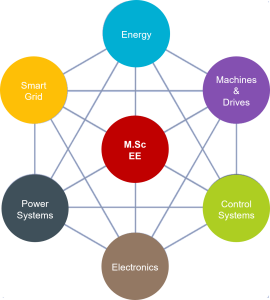Second cycle Degree in Electrical Energy Engineering
The training acquired in this course of study is particularly effective both in the context of all production and service activities related to the generation and transmission of electrical energy and in the very broad industrial/professional context relating to all applications where specific skills are required to be able to convey and use electrical energy safely, effectively and efficiently.
Course presentation
 The Master’s Degree Course in Electrical Engineering (M.Sc. EE) provides a 2-year course of study for 120 University Educational Credits (CFU), divided into two subject areas:
The Master’s Degree Course in Electrical Engineering (M.Sc. EE) provides a 2-year course of study for 120 University Educational Credits (CFU), divided into two subject areas:
Learning objectives
Electrical energy will play a key role in the energy transition and the decarbonisation of industrial processes due to the very high flexibility and ubiquity of its use. The Master’s Degree in Electrical Engineering allows to acquire not only the most advanced knowledge and technological skills in the electrical field, but also a strategic vision necessary to successfully meet the technological and socio-economic challenges of the future. The preparation acquired in this course is designed both for the context of production and service activities related to the generation and transmission of electrical energy and in the industrial and professional context (e.g. in the field of electric mobility) where specific skills are required to convey and use electrical energy safely, effectively and efficiently. This type of preparation has been and continues to be particularly appropriate for integration into the production structure in the territory, which is characterised by numerous companies in the plant engineering, electromechanical, electronic and automation sectors and by many facilities dedicated to the production of electrical energy, from conventional and renewable sources, and to its distribution and management. At the same time, with the knowledge of the most recent developments in the technological/application field, the aim is to promote innovation in small and medium-sized enterprises as well.
Occupational perspectives
The main occupational opportunities concern the design and supervision of the construction of complex electrical components and systems and the operational management of plants and systems where processes related to the use of electrical energy are present. Master’s graduates find employment in:- Electromechanical industries (electrical components, power electronics applications, industrial automation)
- Non-electrical manufacturing industries (processes connected to the use of electrical energy, generation from renewable sources, cogeneration systems, energy storage systems)
- Public and private organisations (management of both conventional and innovative electrical generation systems, networks and devices)
- Engineering companies (consultancy and professional firms for the design and management of systems and processes in the energy, automation and communication sector)
- Universities and research organisations (electrical and energy sector at national and international level)
Access
Natural access to the Master’s Degree Course in Electrical Energy Engineering takes place from the Degree Course in Energy Engineering in Padua. Detailed information is available here. Information on access by students who have obtained their degree in other university locations, or who have obtained degrees in disciplines other than Electrical Engineering, can be found at this page.

